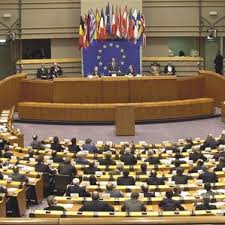
The inaugurating celebrations in Athens in early January for the delegation of the presidency of the European Union to Greece were marred by a preposterous event: the escape of Christodoulos Xiros. Xiros is the most notorious serial killer in Greece and principal hit man of the terrorist group November 17, an organization active between 1979 and 2002, responsible for the murder of 23 politicians, army officers, businessmen, policemen and innocent bystanders. Five American nationals count among his victims.
What outraged Athenians and the US State Department alike was the fact that Xiros did not escape from the prison where was serving a six-life term. On the contrary, he was officially given a week-long probationary freedom by the parole board of the prison. It was during this period that one day, instead of reporting to the police station he vanished instead. Adding insult to injury, the members of the board when asked the grounds on which they accorded to Xiros his leave, insisted defiantly that they were acting in accordance with humanitarian regulations set by the European Union precepts dictated to European lawmakers by the "guiding moral principles of Western Civilization." According to those same principles, the police did not have the authority to follow him when on the loose. Lacking only a burning bush to give this absurd theory a biblical dimension, authorities dismissed Xiros' escape as "a mere accident" of the European legal system, to the horror of society.
The pervading theory in the European Union is that a prison sentence is not a punitive act but a necessary step in reforming the inmate's character. Under this light, prisoners are granted release on temporary license in order to be helped in settling into normal life once their sentence is finished. According to the European penal code, leaves are granted "subject to the good behavior of the prisoner." However, what defines "good behavior" is yet to be clearly defined by the legislators in Brussels. The fact that Xiros set his cell on fire about two years ago, reacting in this way to poor ventilation, was not considered an action worth taking into character consideration. Nor was the fact that he never officially repented for his crimes. Their political motivation was not provided by any official clause in the evaluation process and therefore was not addressed.
Common sense also dictates that a prisoner who is given leave must be deemed a minimal risk to the community. The guarantee of security is a politician's prevailing responsibility towards his electorate. Thus the escape of Xiros has become a political imbroglio of European dimensions.
2014 is a crucial year for the fate of Europe as the upcoming May elections for the European Parliament are marked by a rise of Euroskepticism. For decades Europeans focused on the benefits of the Union's economic expansion and the single currency's success story and the success story. The financial crisis of 2008 moved the spotlight onto ideology. More and more Europeans are now beginning to have second thoughts about the Union by reevaluating the transformation their societies underwent by the legislators in Brussels. Xiros' escape has brought forth with a loud bang the rift among European nationals between the prevailing lofty principles of a European "ethos" that guides the legislators of the European Parliament in forging their European policies versus a growing need for common sense.
By signing the 2009 Lisbon Treaty the European community reinforced the values on which the European Union was built. Brussels, the official capital of the Union was given power to decide over matters that formerly were the responsibility of national governments.
As a result, a moralizing language was institutionalized while various authorities charged with representing the interest of the public began evaluating their cases with strange outcomes for local societies. In contrast, the power to change legislation no longer lay with the normal majority of voters as in national elections. It required instead a massive collective effort from voters in several countries in order to elect the necessary amount of representatives who can then lobby for the change. This task proved so hard to orchestrate that more and more Europeans began feeling that they had been deceived by their own governments into handing their self-determination to an abstract Europe.
The instrument for best implementing the values of Western civilization conceived by legislators in Brussels is multiculturalism. Presenting itself as a policy of integration and social cohesion multiculturalism promotes diversity. And it is this acceptance of otherness that's bound to give the European world its inherent cosmopolitan feeling of "society at ease." At least this is the goal set by European legislation and the aspiration is enforced upon societies in a didactic manner with a waving finger. Social groups not feeling at ease with this centralized sociopolitical approach are derogatorily labeled provincial, ethnocentric, inward-looking and showered with all the synonyms for regressiveness.
Nevertheless, this exacted respect for diversity from European citizens is not so much being about the fusion of the various cultures within the European Union into an exciting and creative European identity. According to the principles set by Brussels, Europe should be more concerned with the introduction of foreign cultures in its cultural fabric regardless of the imported culture's desire to become assimilated by the hosting European societies. Thus, a rapidly growing number of Europeans are seeing multiculturalism as a vehicle of foreign cultures for imposing their own set of values onto the societies that welcome them.
The legislators in Brussels belong to the generation of the civil rights movement. The post-war generation in the 1960s and 1970s. In their efforts to make the world a better place to live in, they were motivated by selflessness and adopted activism: perceiving the inequalities of their world, they waged war against a sclerotic and reactionary society in order to set them straight.
 Paris, May 1968
Paris, May 1968
It was a totally perverted and distorted version of this type of war on society that sent Christodoulos Xiros into the arms of terrorism. Otherwise why should the maker of traditional music instruments, and painter of religious icons to boot, start murdering unsuspected innocent victims? Their status represented the administrative arm of a society he considered responsible for social injustice and wished to eradicate. This is why two days ago Xiros appeared on the internet, delivering, to a stunned audience, an apocalyptic message of hate and call to arms while posing defiantly in front of a black wall, loaded with symbols of the civil rights movement such as Che Guevara (the world-wide martyr of youthful rebellion) and red flags. His staging and content of speech felt like an eerie apparition straight out of the late 1960s.
Fifty years later from the heyday of Che Guevara, the world has changed. European societies have outgrown the inequality issues that motivated the generation of activists. Yet lawmakers in Brussels persist that they alone reflect the true ideals of Western civilization which they try to impose on their societies. Their interpretations of the basic democratic attributes today seem to encumber the European societies they are supposed to help. Their obstinate self assurance is as convincing to the public as was Alice searching for certainty in Wonderland. Perceiving this attitude as oversized egos and an abuse of power by the legislators, many disillusioned Europeans react by taking a very uncongenial turn. In an ironic twist of fate, Europeans are flirting with the forces against which the founding fathers of the European Union conceived it. They created then a bulwark for the protection of those same democratic principles that their descendants are questioning today.
This is how the meteoric rise of the far right all over Europe is explained. Marine Le Pen's French National Front is heading the polls with a staggering 40% and many extreme right factions across Europe follow closely.
If the European Union wishes to dispel the concerns of its subjects that lead to Euroscepticism, its new parliament will have to alter the existing political landscape, conjuring a sense of trust by modifying its humanitarian policy with society. Criteria can no longer be based on abstract utopian theories but on the realistic needs of local societies.
 Four major issues will have to be tackled head on, without falling prey to the easy lure offered by extremist solutions:
Four major issues will have to be tackled head on, without falling prey to the easy lure offered by extremist solutions:
- The impounding of illegal immigration and the gradual flow of absorption for the integration while assuring with all sorts of programs the cohesion of the communities.
- The control of the proliferation of fanatical factions, such as radical Islam, within an applied framework of freedom of worship.
- The eradication of violence and terrorism, by stressing within the supporting structure of civil liberties, the people's right to liberty along with their right to security.
- The gargantuan task of forging a European identity by respecting, and blending, instead of discarding, the customs and distinctive way of life of thousands of local societies from Ireland to Poland and from Norway to Greece.
During these crucial months of European electoral campaign the city of Athens will be acting as the informal capital of Europe. Athens is also the birthplace of the one notion, supreme to both legislators and societies at large: Democracy. Democracy not in some abstract sense of the term but in its most archetypal meaning, the fusion of the words 'demos' (society) and 'kratos' (statehood). If Brussels would begin focusing on giving society back its stature, the European Union would rediscover the essence of democracy. Europeans would start perceiving any new legislation as their own law and no longer as an intrusion. Trust would be restored, along with a sense of security which would minimize reasons for reaction.
Michael Radou Moussou is an elected councilor for the City of Athens. He is also the President of the Likabettus Society for the Preservation of National Patrimony in Athens.
